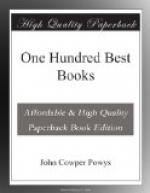The compiler has placed in this list only one of Dickens’ books for a somewhat different reason from that which has influenced him in other cases. All Dickens’ novels have a unique value, and such an equal value, that almost any one of them, chosen at random, can serve as an example of the rest.
Those who still are not prohibited, by temperamental difficulty or by some modern fashion, from enjoying the peculiar atmosphere of this astonishing person’s work, will be found reverting to him constantly and indiscriminately. “Great Expectations” is perhaps, as a more “artistic” book than the rest, the most fitted of them all to entice towards a more sympathetic understanding of his mood, those who are held from reading him by some more or less accidental reason. The most characteristic thing about this great genius is the power he possesses of breathing palpable life into what is often called the inanimate. Like Hans Andersen, the writer of fairy-stories, and, in a measure, like all children, Dickens endows with fantastic spirituality the most apparently dead things in our ordinary environment.
His imagination plays superb tricks with such objects and things, touching the most dilapidated of them with a magic such as the genius of a great poet uses, when dealing with nature—only the “nature” of Dickens is made of less lovely matters than leaves and flowers.
The wild exaggerations of Dickens—his reckless contempt for realistic possibility—need not hinder us from enjoying, apart from his revelling humor and his too facile sentiment, those inspired outbursts of inevitable truth, wherein the inmost identity of his queer people stands revealed to us. His world may be a world of goblins and fairies, but there cross it sometimes figures of an arresting appeal and human voices of divine imagination.
61. JANE AUSTEN. PRIDE AND PREJUDICE.
Jane Austen’s delicate and ironic art will remain unassailable through all changes of taste and varieties of opinion. What she really possesses—what might be called the clue to her inimitable secret—is nothing less than the power of giving expression to that undying ironic detachment, touched with a fine malice but full of tender understanding, which all women, to some degree or other, share, and which all men, to some degree or other, suffer from; in other words, the terrible and beautiful insight of the maternal instinct. The clear charm of her unequalled style—a style quite classical in its economy of material and its dignified reserve—is a charm frequently caught in the wit and fine malice of one’s unmarried aunts; but it is, none the less, the very epitome of maternal humor. As a creative realist, giving to her characters the very body and pressure of actual life, no writer, living or dead, has surpassed her. Without romance, without philosophy, without social theories, without pathological curiosity, without the remotest interest in “Nature,” she has yet managed to achieve a triumphant artistic success; and to leave an impression of serene wisdom such as no other woman writer has equaled or approached.




